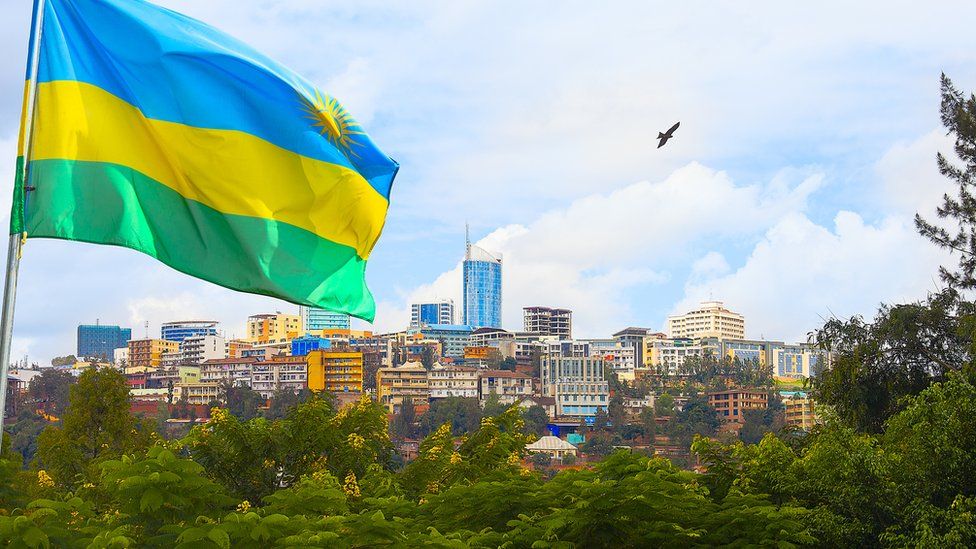
The UK government wants to send some asylum seekers to Rwanda.
But the Court of Appeal has ruled that the policy is unlawful.
However, its decision could be challenged in the Supreme Court.
What is the Rwanda asylum plan?
The five-year trial – announced in April 2022 – would see some asylum seekers sent to Rwanda on a one-way ticket, to claim asylum there.
They may be granted refugee status to stay in Rwanda. If not, they can apply to settle there on other grounds, or seek asylum in another “safe third country”.
The government says the plan will deter people arriving in the UK through “illegal, dangerous or unnecessary methods”, such as on small boats which cross the English Channel.
More than 45,700 people used this route to come to the UK in 2022, the highest figure since records began.
Small-boat crossings decreased slightly in the first few months of 2023 but numbers could rise again in the summer.
Is the Rwanda scheme legal?
Opponents have consistently argued that Rwanda is not a safe destination for asylum seekers, and that the scheme breaks human rights laws.
In June 2023, the Court of Appeal overturned an earlier ruling by the High Court that the Rwanda plan was lawful.
The judges ruled that Rwanda is not a safe third country, and that it would be unlawful for asylum seekers to be removed there.
The ruling said there are “deficiencies” in the Rwandan asylum system which mean that some claimants could be sent back to their home countries, where they might face persecution.
It was not a unanimous decision. Two judges – the Master of the Rolls and Lord Justice Underhill – decided the policy is not lawful, while the Lord Chief Justice Lord Burnett agreed with the High Court’s earlier decision that Rwanda is a safe third country.
However, legal proceedings may not be over.
If a further appeal of this ruling is allowed, the case could go to the Supreme Court.
In the meantime, flights cannot take off to Rwanda.
No asylum seeker has actually been sent to the country so far. The first flight was scheduled to go in June 2022, but was cancelled after legal challenges.
Image source, Reuters
Ms Braverman (centre) pictured on a visit to Rwanda in March 2023
Home Secretary Suella Braverman insists Rwanda is a safe country for migrants, telling the BBC that the country has “a track record of successfully resettling and integrating people who are refugees or asylum seekers”.
How many people could be sent to Rwanda?
The UK government previously said “anyone entering the UK illegally” after 1 January 2022 could be sent, with no limit on numbers.
Rwanda says it can process 1,000 asylum seekers during the trial period, but has capacity for more.
But in October 2022, Privilege Style – the airline which was scheduled to take asylum seekers to Rwanda – withdrew from its Home Office contract, after a campaign by refugee charities.
At the time the Guardian reported that two other airlines which had previously conducted deportation flights, Titan Airways and AirTanker, had also ruled out participation in the Rwanda scheme.
How much will the plan cost?
So far the UK has paid the Rwandan government £140m for the scheme but it has not provided an overall cost.
An economic-impact assessment for the Illegal Migration Bill estimated removing each individual to a third country, such as Rwanda, would cost the government £169,000.
But the assessment – published in June 2023 – added the new measures could save between £106,000 and £165,000 per individual sent abroad by avoiding housing costs in the UK.
Other costs include flights to Rwanda, food, accommodation, access to translators and legal advice. Removing people from the UK by charter flight cost more than £13,000 per person in 2020.
When the policy was first announced, then Home Office Minister Tom Pursglove said the cost would be “similar to the amount of money we are spending on this currently”. He said that “longer term, by getting this under control, it should help us to save money”.
The UK’s asylum system costs £3bn a year. Almost £7m a day is spent on hotel accommodation for refugees and asylum seekers.
Critics say the daily cost is so high because of the time taken to decide on applications, and a ban on asylum seekers working while waiting for confirmation of their status.
What is an asylum seeker?
The UN Refugee Agency defines an asylum seeker as someone who has applied for shelter and protection in another country.
A refugee is a person who has fled conflict or persecution in their own country.
The legal rights of refugees are protected by international law. However, it is up to host countries to decide whether an asylum seeker is granted refugee status.
In 2022, the UK received more than 89,000 asylum applications, the highest number for 20 years. Of these, more than 23,800 people and their dependants were granted a form of protection.








